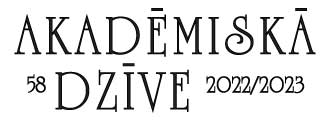“Labs pilsonis” Latvijas iedzīvotāju uztverē
DOI:
https://doi.org/10.22364/adz.58.11Keywords:
labs pilsonis, pilsonība, pilsoniskās vērtībasAbstract
Šī pētījuma datos vērojamais apolitiskums parādījās arī diskusijās ar jauniešiem, kuri intereses par politiku un politisko aktivitāšu trūkumu neuzskatīja par šķērsli, lai būtu labs pilsonis
References
Bolzendahl, C.; Coffé, H. (2013) Are ‘Good’ Citizens ‘Good’ Participants? Testing Citizenship Norms and Political Participation across 25 Nations. Political Studies, 61(1), 45–65. https://doi.org/10.1111/1467-9248.12010
BSZI (2001) Pētījumu un rīcības programma “Ceļā uz pilsonisku sabiedrību”: Latvijas iedzīvotāju aptauja 2000. gada novembris: Atskaite. Rīga.
Cohen, A. K.; Dawley-Carr, J. R.; Pappas, L.; Staudinger, A. (2013) Civic Studies: Fundamental Questions, Interdisciplinary Methods. The Good Society, 22(2), 122–136. https://doi.org/10.1353/gso.2013.0010
Coleman, S.; Blumler, J. G. (2009) The Internet and Democratic Citizenship: Theory, Practice and Policy. Cambridge University Press.
Conover, P. J.; Searing, D. D.; Crewe, I. (2004) The Elusive Ideal of Equal Citizenship: Political Theory and Political Psychology in the United States and Great Britain. The Journal of Politics, 66(4), 1036–1068. https://doi.org/10.1111/j.1468-2508.2004.00289.x
Dalton, R. J. (2008) The Good Citizen: How a Younger Generation is Reshaping American Politics. Washington DC: CQ Press A Division of SAGE.
Denters, B.; Gabriel, O.; Torcal, M. (2007) Norms of good citizenship. Deth, J. W. van; Montero, J. R.; Westholm, A. (eds) Citizenship and Involvement in European Democracies: A comparative analysis. Routledge.
Deth, J. W. van (2008) In Search of the “Good European Citizen”: WYSIWYG? Paper presented at the Final Conference of the CONNEX Network of Excellence Plenary Session on “Civil Society, Social Capital, and Interest Intermediation”, Mannheim, March 6–8 2008.
Deth, J. W. van (2008a) Norms of Citizenship. Dalton, R. J.; Klingeman, H. D. (eds) The Oxford Handbook of Political Behavior. Oxford, New York: Oxford University Press.
Enslin, P. (2000). Education and democratic citizenship: In defence of cosmopolitanism. Leicester, M.; Modgil, C.; Modgil, S. (eds) Politics, education and citizenship. New York: Falmer Press, 149–150.
Ichilov, O.; Nave, N. (1981) “The Good Citizen” As Viewed by Israeli Adolescents. Comparative Politics, 13(3), 361. https://doi.org/10.2307/421903
Isin, E. F. (1997) Who is the new citizen?: Towards a genealogy. Citizenship Studies, 1(1), 115–132. https://doi.org/10.1080/13621029708420650
Kligler-Vilenchik, N. (2017) Alternative citizenship models: Contextualizing new media and the new “good citizen”. New Media & Society, 19(11), 1887–1903. https://doi.org/10.1177/1461444817713742
Kunda, I.; Strode, I. (2008) Pilsoņi, patrioti un citplanētieši: dažas dilemmas pilsoniskās izglītības praksē. Tūna, A. (red.) Izglītības pētījums 2008: Pilsoniskās izglītības jēdziens, prakse un rezultāti: virzība uz darbībā balstītu modeli sabiedrības saskaņas veicināšanā. Rīga.
Pilsonības likums. Pieejams: https://likumi.lv/ta/id/57512-pilsonibas-likums (15.05.2022.).
Peled, Y. (1992) Ethnic Democracy and the Legal Construction of Citizenship: Arab Citizens of the Jewish State. American Political Science Review, 86(2), 432–443. https://doi.org/10.2307/1964231
Prior, D.; Stewart, J.; Walsh, K. (1995) Citizenship: Rights, Community and Participation. London: Pitman Publishing.
Prior, W. (1999) What it Means to be a “Good Citizen” in Australia: Perceptions of Teachers, Students, and Parents. Theory & Research in Social Education, 27(2), 215–247. https://doi.org/10.1080/00933104.1999.10505879
Schnaudt, C.; Deth, J. W. van et al. (2021) Revisiting norms of citizenship in times of democratic change. Politics, 026339572110317. https://doi.org/10.1177/02633957211031799
Shachar, A. et al. (2020) Introduction: Citizenship – Quo Vadis? Shachar, A. et al. (eds) The Oxford Handbook of Citizenship. Oxford, New York: Oxford University Press.
SKDS (2007) Attieksme pret pilsonisku sabiedrību. Latvijas iedzīvotāju aptauja (veikts pēc ĪUMSILS pasūtījuma). Rīga. – Pētījuma ziņojums.
Theiss-Morse, E. (1993) Conceptualizations of good citizenship and political participation. Political Behaviour, 15(4), 355–380.
Thorson, K. (2012) What Does It Mean to Be a Good Citizen? Citizenship Vocabularies as Resources for Action. The ANNALS of the American Academy of Political and Social Science, 644(1), 70–85. https://doi.org/10.1177/0002716212453264
Villalobos, C.; Morel, M. J.; Treviño, E. (2021) What Is a “Good Citizen”?: A Systematic Literature Review. Treviño, E.; Carrasco, D.; Claes, E.; Kennedy, K. J. (eds) Good Citizenship for the Next Generation. IEA Research for Education (A Series of In-depth Analyses Based on Data of the International Association for the Evaluation of Educational Achievement (IEA)), 12. Springer, Cham. https://doi.org/10.1007/978-3-030-75746-5_2
Westheimer, J.; Kahne, J. (2004) What Kind of Citizen? The Politics of Educating for Democracy. American Educational Research Journal, 41(2), 237–269. https://doi.org/10.3102/00028312041002237
Zepa, B.; Kļave, E. (red.) (2011) Latvija: Pārskats par tautas attīstību 2010/2011: Nacionālā identitāte, mobilitāte un rīcībspēja. Rīga: LU Sociālo un politisko pētījumu institūts.


